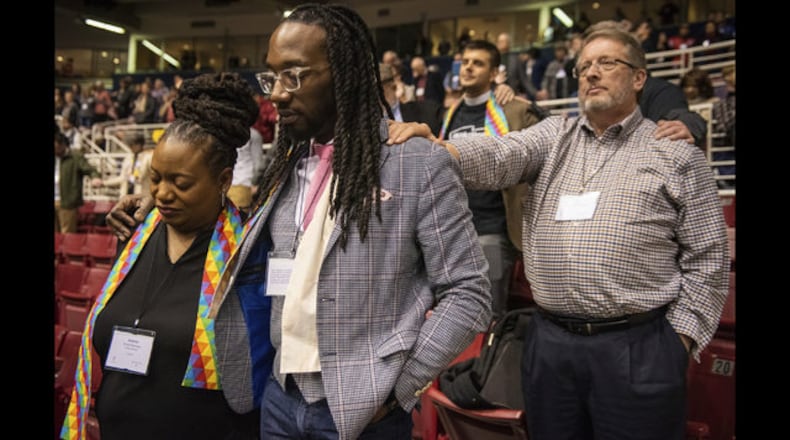Across the country United Methodists braced for the fallout from a controversial decision Tuesday to uphold — and strengthen — language in its book of laws that bans same-sex marriage and the ordination of LGBTQ clergy.
UMC pastors and members feared that whichever way the votes landed during a special session of the church’s General Conference in St. Louis, that in the aftermath it would mean an exodus from either progressives or more conservative members of the mainline denomination.
For Georgians, the vote was already impacting congregations.
“I feel wonderful,” said the Rev. Randy Mickler, pastor emeritus of Mt. Bethel United Methodist Church in Marietta, who did not attend the conference. Mickler said he wanted a traditional plan “with teeth. "I’m not surprised that the great majority of United Methodists believe in the authority of Scripture and that’s what this victory is about," he said.
Progressives, though, had hoped for approval of a proposal, the One Church Plan, that would have paved the way for clergy, local congregations and conferences to make their own decisions about ordaining gay clergy or conducting same-sex marriages. The Traditional Plan does the opposite, tightening the Protestant denomination’s line on homosexuality, gay marriage and ordination issues.
The Rev. Beth LaRocca-Pitts, senior pastor of St. Mark United Methodist Church in Atlanta, said the traditional plan passed but the constitutionality of the plan is still up for review. The plan does not take effect until January 2020, and next week one of the large groups of more conservative Methodists are expected to meet to consider pulling out of the denomination, she said.
Some conference speakers warned the church risked alienating not only progressives with the traditional plan, but those in the center as well.
James Kingman, an Atlanta licensed professional counselor who is openly gay and grew up in the Methodist Church, called the proceedings troublesome.
“This has the potential to impact the broader community as well as people who are marginalized and disenfranchised with religion. I think it’s a pivotal point,” said Kingman, whose great-grandfather was a Methodist minister and former president of a United Methodist university, “Watching from the sidelines it’s disheartening to see that divide and how challenging it is for every one to come to a consensus and find a path forward. It’s disheartening for people who have been waiting to be validated for a long time in this church system.”
>> RELATED | United Methodists fear split over LGTBQ vote in church
Allowing pastors to perform same-sex marriages and ordaining “self-avowed practicing” gay clergy have been among the most controversial issues facing the United Methodist Church’s more than 12.6 million members worldwide, including almost 7 million in the U.S. The controversy goes back decades.
General Secretary Susan Henry-Crowe of the General Board of Church and Society of the United Methodist Church and former dean of chapel and religious life at Emory University, released a statement saying that there were moments during the St. Louis conference — her 11th — that “broke the heart of God.”
“I want to begin with a word to my LGBTQIA friends, colleagues, and neighbors,” the statement said. ” You are beloved of God. Your lives and your relationships are sacred and holy and I grieve the harm done to you through words and actions in the name of Christ.”
Gail Smith, a retired staff manager who lives Monroe, said she was “very disturbed about the situation. I do not care if you are red, green, yellow, black, LGBT or white, we are all the same in God’s sight and I certainly am not going to judge since I am not God.”
She plans to stay put and “live with the outcome," she said. "It surely will be sad to see other fellow members leave. We will just have to live with the outcome and pray for the best.”
The General Conference drew more than 864 delegates from throughout the U.S. and as far away as Kenya and the Philippines. Some of the most conservative — and vocal — churches are in Africa.
The next general meeting will be held in 2020 in Minneapolis.
“The full outcome may not be for a year or two because there are still a lot of things that have to be worked out and that will take time,” said Ken Walden, president-dean of Gammon Theological Seminary in Atlanta. "That’s everything from who is going to leave, who is going to stay and how this will manifests itself in their faith and ministry.”
About the Author
The Latest
Featured



